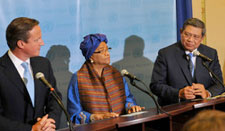
Give peace a chance. This is the message of the High-Level Panel, who singled out peace as a cornerstone of the post-2015 development agenda in their much-anticipated report released yesterday. The report stresses how freedom from conflict and violence are not just a means to an end, but ends in and of themselves. Such freedoms are “fundamental human entitlements” and “essential foundations for peaceful and prosperous societies.” Given simmering violence in the Middle East and across the Sahel, their message could not be more timely.
In putting peace squarely on the post-2015 development agenda, a historical wrong has finally been corrected. When the Millennium Declaration, which gave rise to the Millennium Development Goals (MDGs), was being crafted in the late 1990s, goals and targets on peace and security were quietly dropped from the final text. Now, they are front and center in the discussion. And rightly so. As the panel observes, “without peace, there can be no development.”
In this study, the panel called attention to the key building blocks of peace. These include personal security, access to justice, freedom from discrimination and persecution, and a louder voice in the decisions that affect the lives of the poor. As their report makes clear, these aspirations, together with transparent, accountable, and responsive governance institutions, are at the core of development, and not optional extras.
While careful not to be overly prescriptive, the panel also set out some useful metrics to guide the UN Secretary-General and the General Assembly in their deliberations, which are taking place from now through 2016. True to its ambitious mandate (and after some nudging from civil society), the panel called for “more stable and peaceful societies” as one of its twelve headline goals. The focus on peace is forceful and unambiguous: it’s mentioned no fewer than 40 times in the document. And the panel sets out some practical steps toward how peace and stability might be achieved.
The panel recommends at least one target devoted to reducing violent deaths (per 100,000) and eliminating violence against children. Allusions to violence prevention and reduction in the text are similarly common, noted some 45 times. They also reflect a growing consensus in policy and academic circles, particularly the focus on children. Special attention is given to ending gender violence and physical violence committed against women and girls.
Another suggested target is for more accessible, independent, and adequately resourced justice institutions that respect due process. This is a tall order, but an important one. As the panelists well know, justice systems that are remote from the people, politicized, and poorly funded contribute to impunity and the collapse of the rule of law. The United Nations and others have started to make some important advances in thinking about measuring effective and efficient justice processes.
The call for a target to stem external stresses leading to conflict, including those related to organized crime, is novel. A growing body of research is demonstrating how no country is immune to criminal networks, including those dealing in drugs, arms, and illicit resources. A narrow focus on investing in development within societies without regard for outside influences is short-sighted and potentially counter-productive.
A final target signaled by the panel is enhancing the capacity, professionalism, and accountability of the armed forces, police, and judiciary. This is a welcome addition, since it acknowledges the nuts and bolts of peacemaking, peacekeeping, and peacebuilding. As anyone walking the streets of Beijing, Delhi, Lagos, Rio, or London knows, security and justice institutions must be both credible and capable if they are to deliver the (public) goods.
Each of these milestones offers important clues about possible indicators that could track progress. At a minimum, these will need to capture real impacts on people and their perceptions, and the performance of institutions. The good news is that some countries already have the necessary statistical machinery to monitor peace, including systems to track intentional homicide, sexual assault, fear of walking alone at night, police misconduct, and the like. But there are also real gaps in their capacities that need filling.
The High-Level Panel report is forward-looking, calling attention to new threats and revolutionary big data harvesting methods that are changing our world. It is comprehensive, and emphasizes not just objective metrics of progress, but also tools to capture how people feel. The report is also universal in that it focuses on all countries instead of just of a small selection. All in all, it offers some inspired signposts for the post-2015 development discussion.
Robert Muggah is the Research Director of the Igarapé Institute, a Principal of the SecDev Group, and a professor at the Instituto de Relações Internacionais, Pontifícia Universidade Católica do Rio de Janeiro.
About the photo: The High-Level Panel co-chairs, from left: Prime Minister David Cameron of the United Kingdom, President Ellen Johnson Sirleaf of Liberia, and President Susilo Bambang Yudhoyono of Indonesia. Photo Credit: High-Level Panel on the post-2015 Development Agenda website.




